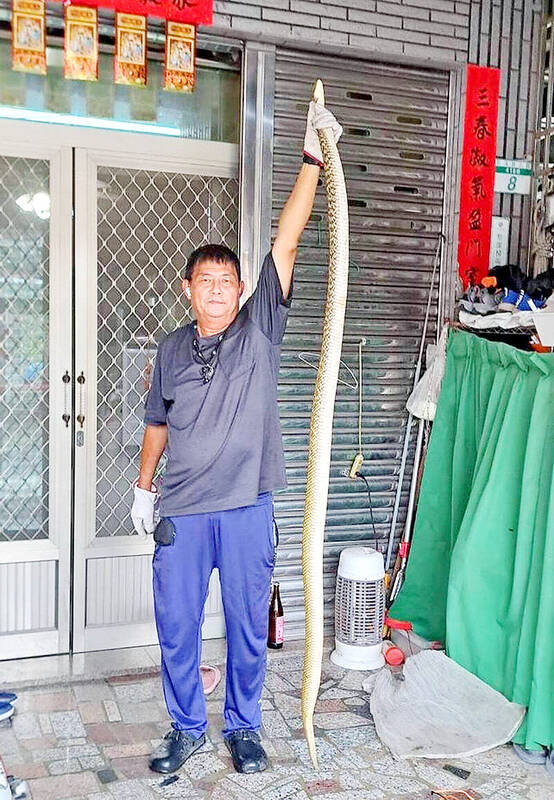The Tainan City Government last week said it responded to calls from the public and captured almost 6,000 snakes last year.
A total of 5,967 snakes were caught in Tainan last year, according to data compiled by the city government’s Agriculture Bureau.
Two native species, the Taiwanese king rat snake and Chinese cobra, were the most commonly captured among the 20 different species, it said.

Photo coutesy of Chang Ming-chang
The bureau said it captured 1,570 king rat snakes, along with 1,319 Chinese cobras. Also captured were 798 Oriental rat snakes, 603 beauty rat snakes, followed by three highly venomous species: 522 Taiwanese kraits, 277 Taiwanese mountain pit vipers and 154 Taiwanese bamboo vipers, it said.
The Taiwanese king rat snake is found in most districts of Tainan, while the cobra was most commonly found in Rende District (仁德), with 121 captured, and Madou District (麻豆), with 75, the bureau said.
“The capture of the snakes was contracted out to specialized companies, usually at rates of between 5,000 to 6,000 each year, so last year’s total was within the normal range,” bureau officer Chu Chien-ming (朱健明) said.
The average was about three caught per day for the two species leading the list, Reptile Conservation Association of Taiwan director Wang Shih-hao (王士豪) said.
Native cobras inhabit forest and farmland areas at under 500m elevation, mainly eat rats, frogs and other snakes, and are usually under 1.5m in length, but are sometimes found to reach 2m, Wang said.
“Cobras can adapt to many different environments and were found to have more encounters with humans than before due to destruction of their natural habitat, which makes them more active during daytime and overlap with human activities,” he added.
The peak season for calls by the public is from May to October, the hottest months, and last year the busiest month was August, with 893 snakes captured, while the low season is in winter, from December to February, with more than 100 caught during that period, Wang added.
Most snakes in Taiwan do not hibernate, but during a sudden cold spell, these reptiles have low energy and become inactive, and some enter into a brief respite, known as winter dormancy, and when the temperature rises, they start to move around again, which is why the snakes are less active during the winter, but people could still encounter them, especially in southern Taiwan, Wang said.
“If you encounter a cobra or other snake species outside, do not approach or disturb them, as the snakes do not attack on their own... But many people are not fully aware of this and are scared of the snakes, so they attack and kill them,” he said.
“But that’s the wrong approach, and carries a higher risk of being bitten by the snake. People should just slow down, not strike out and not pose a threat to the snake. Just call to report the snake and keep an eye on its movement. Then you would be safe,” Wang said.

The manufacture of the remaining 28 M1A2T Abrams tanks Taiwan purchased from the US has recently been completed, and they are expected to be delivered within the next one to two months, a source said yesterday. The Ministry of National Defense is arranging cargo ships to transport the tanks to Taiwan as soon as possible, said the source, who is familiar with the matter. The estimated arrival time ranges from late this month to early next month, the source said. The 28 Abrams tanks make up the third and final batch of a total of 108 tanks, valued at about NT$40.5 billion

Two Taiwanese prosecutors were questioned by Chinese security personnel at their hotel during a trip to China’s Henan Province this month, the Mainland Affairs Council (MAC) said yesterday. The officers had personal information on the prosecutors, including “when they were assigned to their posts, their work locations and job titles,” MAC Deputy Minister and spokesman Liang Wen-chieh (梁文傑) said. On top of asking about their agencies and positions, the officers also questioned the prosecutors about the Cross-Strait Joint Crime-Fighting and Judicial Mutual Assistance Agreement, a pact that serves as the framework for Taiwan-China cooperation on combating crime and providing judicial assistance, Liang

A group from the Taiwanese Designers in Australia association yesterday represented Taiwan at the Midsumma Pride March in Melbourne. The march, held in the St. Kilda suburb, is the city’s largest LGBTQIA+ parade and the flagship event of the annual Midsumma Festival. It attracted more than 45,000 spectators who supported the 400 groups and 10,000 marchers that participated this year, the association said. Taiwanese Designers said they organized a team to march for Taiwan this year, joining politicians, government agencies, professionals and community organizations in showing support for LGBTQIA+ people and diverse communities. As the first country in Asia to legalize same-sex

MOTIVES QUESTIONED The PLA considers Xi’s policies toward Taiwan to be driven by personal considerations rather than military assessment, the Epoch Times reports Chinese President Xi Jinping’s (習近平) latest purge of the Chinese People’s Liberation Army (PLA) leadership might have been prompted by the military’s opposition to plans of invading Taiwan, the Epoch Times said. The Chinese military opposes waging war against Taiwan by a large consensus, putting it at odds with Xi’s vision, the Falun Gong-affiliated daily said in a report on Thursday, citing anonymous sources with insight into the PLA’s inner workings. The opposition is not the opinion of a few generals, but a widely shared view among the PLA cadre, the Epoch Times cited them as saying. “Chinese forces know full well that